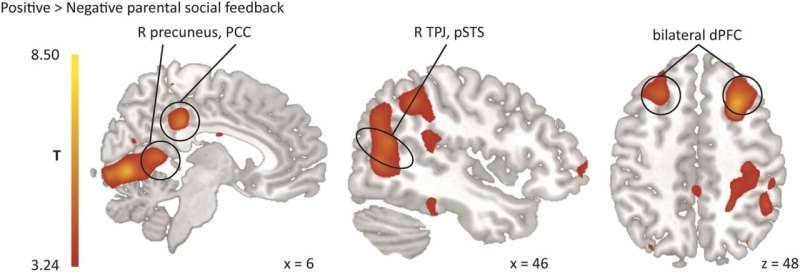Parental criticism hurts: A glimpse inside the adolescent brain

It may seem as though adolescents do as they please, but they are more sensitive to their parents' opinions than they may seem. The adolescent brain reacts strongly to parental criticism or praise. These are the results of a study by an interdisciplinary research group of psychologists and neuroscientists from Leiden University.
An impressive 63 adolescents from 12 to 18 years old participated in the study. During an MRI scan of their brains, they were shown compliments, neutral feedback or criticism of their personality; the compliments, feedback or criticism seemed to come from their parents. "On a screen in the MRI they saw feedback from their parent: "Your father thinks you're mean," or "Your mother thinks you're intelligent." As both parents and adolescents had previously completed questionnaires about these personality traits, the adolescents perceived the parents' comments to be realistic, says researcher Lisanne van Houtum.
Criticism lingers
After each point of praise or criticism, the adolescents indicated their mood. Unsurprisingly, their mood improved after receiving a compliment and deteriorated after receiving a negative comment, particularly when this criticism did not match their self-image. Although the adolescents received the same number of points of criticism, points of praise and neutral comments from their "parent," they felt less good about themselves after the feedback task. Van Houtum: "We therefore think that criticism from parents is more likely to stick than compliments."
Not only did the parental comments do something to the adolescents' self-confidence, but the adolescent brain reacted very differently to compliments than to criticism, as the scans showed. Criticism activated regions of the brain that are involved in processing emotions and pain, regions that are also activated when people experience physical pain. Both criticism and compliments cause activity in areas of the brain that are related to social cognition, such as understanding other people's emotions and intentions.
Pain
"What the results of the scans show is that criticism really does seem to 'hurt.' This pain does not seem to be less in adolescents with a relatively more-positive self-image and who feel their parents are warmer. Interestingly, we did not find that parental praise activates the reward system in the brain," the researcher says. Until now much research has focused on the impact of peer feedback on the adolescent brain and how this relates to adolescent self-esteem. But research data into the influence of parents' opinions on their children is largely lacking.
The results will help the researchers understand what parental compliments and criticism do to adolescents. Van Houtum: "We can make parents aware of the impact of their words. But it can also help shape family therapy and in further research into mental health problems in adolescents, such as depression, where low self-esteem and sensitivity to rejection often play a leading role."
The research was recently published in the scientific journal Developmental Cognitive Neuroscience.
More information: Lisanne A.E.M. van Houtum et al, Adolescents' affective and neural responses to parental praise and criticism, Developmental Cognitive Neuroscience (2022). DOI: 10.1016/j.dcn.2022.101099



















